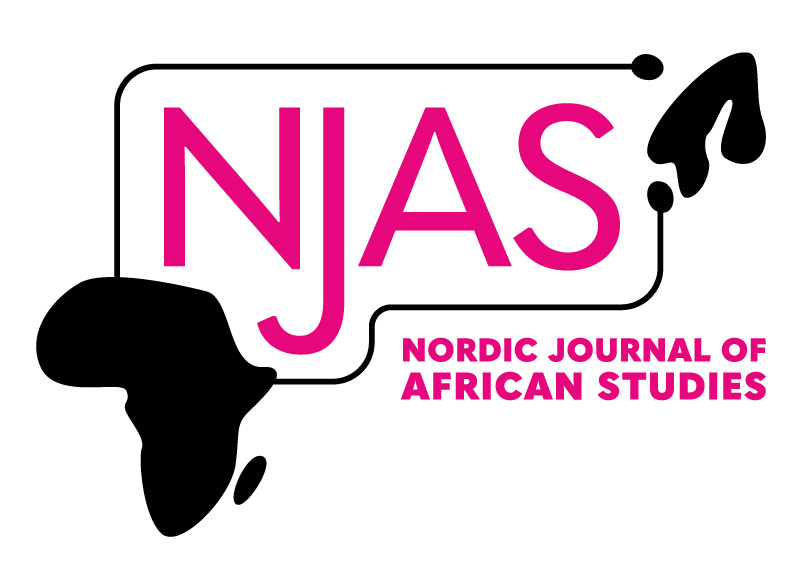Published 2025-03-31
Keywords
- Nigerian diaspora,
- postcolonial crises,
- visual art,
- witnessing,
- spectatorship
- documentary ...More
Copyright (c) 2025 Chichi Ayalogu

This work is licensed under a Creative Commons Attribution 4.0 International License.
How to Cite
Abstract
This article explores diasporic cultural texts that document suffering in homeland contexts. Analysing contemporary visual art produced by Nigerian artists based in Canada and Belgium, and engaging with canonical scholarship on witnessing, spectatorship, and diaspora studies, this article offers a new taxonomy of diasporic witnessing, which, I argue, reflects how a diasporic migratory intelligentsia frames and represents crises in the homeland. By examining the work of three disparate artists, this article argues that diasporic witnessing offers a unique framework for understanding how diasporic subjects with material and cultural currency view, engage with, and respond to political and structural crisis in the homeland.
References
- Achebe, Chinua. 1984. The Trouble with Nigeria. Heinemann.
- Anon. n.d. “Komi Olafimihan - Artist . Poet . Muralist.” ByBlacks.com. Accessed February 4, 2025. https://byblacks.com/directory/artists/Visual%20Artists/3628-komi-olafimihan-artist-poet-muralist
- Anderson, Benedict. 2006. Imagined Communities: Reflections on the Origins and Spread of Nationalism. Verso.
- Arnett, James. 2016. “Taking Pictures: The Economy of Affect and Postcolonial Performativity in NoViolet Bulawayo’s We Need New Names.” Ariel 47 (3): 149–173.
- Ayalogu, Chichi. 2024. “Visual Culture and the Politics of Humanitarian Consumption: The Case of the Biafran Gambit.” Journal of Postcolonial Writing.
- Azoulay, Ariella. 2008. The Civil Contract of Photography. Zone Books.
- Baxi, Upendra. 2002. “Human Rights Movements and Human Rights Markets.” In The Future of Human Rights, 200–233. Oxford Academic.
- Brouillette, Sarah. 2007. Postcolonial Writers in the Global Literary Marketplace. Palgrave MacMillan.
- Brouillette, Sarah. 2011. “Human Rights Markets and ‘Born into Brothels.’” Third Text 25 (2): 169–176.
- Brown, Kimberly Juanita. 2014. “Regarding the Pain of the Other: Photography, Famine, and the Transference of Affect.” In Feeling Photography, edited by Elspeth H. Brown and Thy Phu, 181–203. Duke University Press.
- Chouliaraki, Lilie. 2006. The Spectatorship of Suffering. Sage Publications.
- Chouliaraki, Lilie. 2013. The Ironic Spectator: Solidarity in the Age of Post-Humanitarianism. Polity Press.
- Duplan, Karine, and Sophie Cranston. 2023. “Towards Geographies of Privileged Migration: An Intersectional Perspective.” Progress in Human Geography 47 (2): 333–347.
- Ede, Amatoritsero. 2015. “Narrative Moment and Self-Anthropologizing Discourse.” Research in African Literatures 46 (3): 112–129.
- Falola, Toyin, and Matthew Heaton. 2008. A History of Nigeria. Cambridge University Press.
- Fyffe-Marshall, Kelly. 2020. Black Bodies. Film. Sunflower Studios.
- Hartman, Saidiya. 2007. Lose Your Mother: A Journey Along the Atlantic Slave Route. Farrar, Straus and Giroux: New York.
- Hirsch, Marianne, and Leo Spitzer. 2012. The Generation of Postmemory: Writing and Visual Culture After the Holocaust. Columbia University Press.
- Hirsch, Marianne, and Nancy K. Miller. 2011. Rites of Return: Diaspora Poetics and the Politics of Memory. Columbia University Press.
- Huggan, Graham. 2001. The Postcolonial Exotic: Marketing the Margins. Routledge.
- Ikpe, Ukana B. 2009. “The Patrimonial State and Inter-Ethnic Conflicts in Nigeria.” Ethnic and Racial Studies 32 (4): 679–697.
- Imoagene, Onoso. 2022. “Migrants, Immigrants, and the New Nigerian Diaspora.” In The Oxford Handbook of Nigerian History, edited by Toyin Falola and Matthew M. Heaton, 684–706. Oxford University Press.
- Kendhammer, Brandon. 2014. “Citizenship, Federalism and Powersharing: Nigeria’s Federal Character and the Challenges of Institutional Design.” Ethnopolitics 13 (4): 396–417.
- Lainer‐Vos, Dan. 2010. “Diaspora-Homeland Relations as a Framework to Examine Nation-Building Processes.” Sociology Compass 4 (10): 894–908.
- Little, Suzanne. 2017. “The Witness Turn in the Performance of Violence, Trauma, and the Real.” In Ethical Exchanges in Translation, Adaptation and Dramaturgy, edited by Emer O’Toole, Andrea Pelegrí Kristić, and Stuart Young, 43 – 62. Brill.
- Mbembe, Achille, and Janet Roitman. 1995. “Figures of the Subject in Times of Crisis.” Public Culture 7: 323–352.
- Nwabara, Olaocha Nwadiuto. 2018. “Becoming Black and African: Nigerian Diasporic Transformations of Racial and Ethnic Identities in the United States.” Africology: The Journal of Pan African Studies 12 (1).
- Okpewho, Isidore, and Nkiru Nzegwu. 2009. The New African Diaspora. Indiana University Press.
- Olafimihan, Komi. 2023. Three Hundred Poems. Write Bloody North.
- Olaniyan, Tejumole. 2004. Arrest the Music!: Fela and His Rebel Art and Politics. Indiana University Press.
- Otiono, Nduka. 2011. “Tracking Skilled Diasporas: Globalization, Brain Drain, and the Postcolonial Condition in Nigeria.” Transfers 1 (3): 5–23.
- Pallister-Wilkins, Polly. 2021. “Saving the Souls of White Folk: Humanitarianism as White Supremacy.” Security Dialogue 52 (1): 98–106.
- Pruce, Joel R. 2020. The Mass Appeal of Human Rights. Palgrave Macmillan.
- Quayson, Ato, and Girish Daswani. 2013. “Introduction – Diaspora and Transnationalism.” In A Companion to Diaspora and Transnationalism, edited by Ato Quayson and Girish Daswani, 1–26. Wiley.
- Sontag, Susan. 1977. On Photography. Farrar, Straus and Giroux.
- Sontag, Susan. 2003. Regarding the Pain of Others. Picador.
- Tsuda, Takeyuki. 2013. “When the Diaspora Returns Home: Ambivalent Encounters with the Ethnic Homeland.” In A Companion to Diaspora and Transnationalism, edited by Ato Quayson and Girish Daswani, 172–189. Wiley.
- Ukaegbu, Chikwendu Christian. 2005. “Lessons from Biafra: The Structuration of Socially Relevant Science in the Research and Production Directorate.” Social Forces 83 (4): 1395–1424

